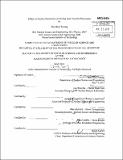Effects of surface parameters on boiling heat transfer phenomena
Author(s)
Truong, Bao H. (Bao Hoai)
DownloadFull printable version (17.53Mb)
Other Contributors
Massachusetts Institute of Technology. Dept. of Nuclear Science and Engineering.
Advisor
Lin-Wen Hu, Jacopo Buongiorno and Tom McKrell.
Terms of use
Metadata
Show full item recordAbstract
Nanofluids, engineered colloidal dispersions of nanoparticles in fluid, have been shown to enhance pool and flow boiling CHF. The CHF enhancement was due to nanoparticle deposited on the heater surface, which was verified in pool boiling. However, no such work has been done for flow boiling. Using a cylindrical tube pre-coated with Alumina nanoparticles coated via boiling induced deposition, CHF of water was found to enhance up to 40% compared to that of the bare tube. This confirms that nanoparticles on the surface is responsible for CHF enhancement for flow boiling. However, existing theories failed to predict the CHF enhancement and the exact surface parameters attributed to the enhancement cannot be determined. Surface modifications to enhance critical heat flux (CHF) and Leidenfrost point (LFP) have been shown successful in previous studies. However, the enhancement mechanisms are not well understood, partly due to many surface parameters being altered at the same time, as in the case for nanofluids. Therefore, the remaining objective of this work is to evaluate separate surface effect on different boiling heat transfer phenomena. In the second part of this study, surface roughness, wettability and nanoporosity were altered one by one and respective effect on quenching LFP with water droplet was determined. Increase in surface roughness and wettability enhanced LFP; however, nanoporosity was most effective in raising LFP, almost up to 100°C. The combination of the micro posts and nanoporous coating layer proved optimal. The nanoporous layer destabilizes the vapor film via heterogeneous bubble nucleation, and the micro posts provides intermittent liquid-surface contacts; both mechanisms increase LFP. In the last part, separate effect of nanoporosity and surface roughness on pool boiling CHF of a well-wetting fluid, FC-72, was investigated. Nanoporosity or surface roughness alone had no effect on pool boiling CHF of FC-72. Data obtained in the literature mostly for microporous coatings showed CHF enhancement for well wetting fluids, and existing CHF models are unable to predict the enhancement.
Description
Thesis (Ph. D.)--Massachusetts Institute of Technology, Dept. of Nuclear Science and Engineering, 2011. Cataloged from PDF version of thesis. Includes bibliographical references (p. 148-156).
Date issued
2011Department
Massachusetts Institute of Technology. Department of Nuclear Science and EngineeringPublisher
Massachusetts Institute of Technology
Keywords
Nuclear Science and Engineering.